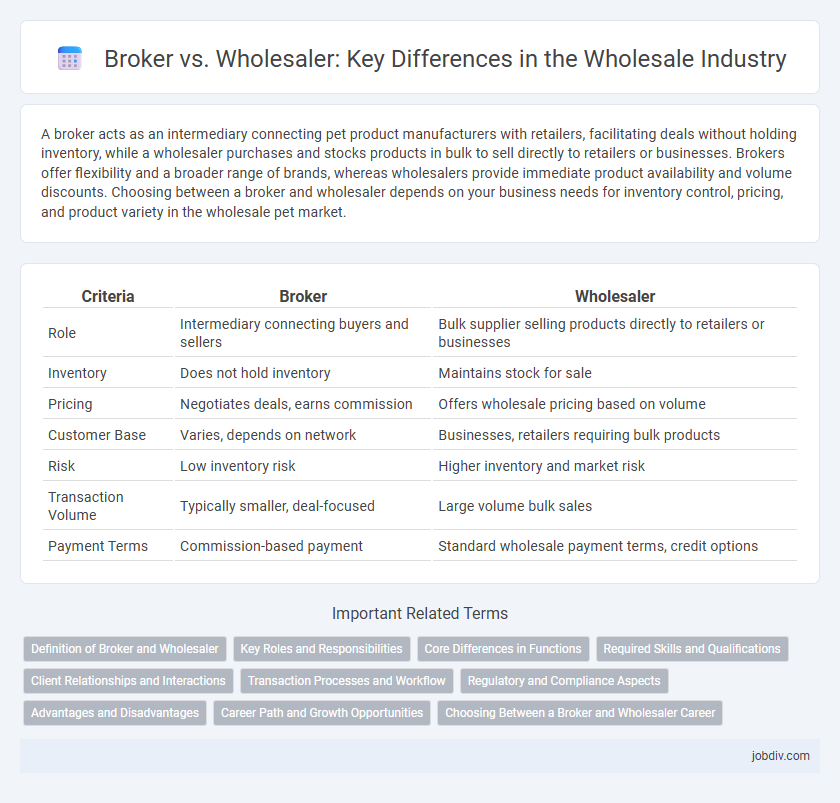A broker acts as an intermediary connecting pet product manufacturers with retailers, facilitating deals without holding inventory, while a wholesaler purchases and stocks products in bulk to sell directly to retailers or businesses. Brokers offer flexibility and a broader range of brands, whereas wholesalers provide immediate product availability and volume discounts. Choosing between a broker and wholesaler depends on your business needs for inventory control, pricing, and product variety in the wholesale pet market.
Table of Comparison
| Criteria | Broker | Wholesaler |
|---|---|---|
| Role | Intermediary connecting buyers and sellers | Bulk supplier selling products directly to retailers or businesses |
| Inventory | Does not hold inventory | Maintains stock for sale |
| Pricing | Negotiates deals, earns commission | Offers wholesale pricing based on volume |
| Customer Base | Varies, depends on network | Businesses, retailers requiring bulk products |
| Risk | Low inventory risk | Higher inventory and market risk |
| Transaction Volume | Typically smaller, deal-focused | Large volume bulk sales |
| Payment Terms | Commission-based payment | Standard wholesale payment terms, credit options |
Definition of Broker and Wholesaler
A broker acts as an intermediary who facilitates transactions between buyers and sellers without taking ownership of the goods, earning commissions for their services. A wholesaler purchases products in bulk directly from manufacturers or distributors and sells them in smaller quantities to retailers or other businesses, holding inventory to manage supply. Brokers specialize in connecting parties and negotiating deals, while wholesalers focus on inventory management and distribution within the supply chain.
Key Roles and Responsibilities
Brokers act as intermediaries connecting buyers and sellers without taking ownership of goods, focusing on negotiation, contract facilitation, and market expertise. Wholesalers purchase products in bulk from manufacturers, handle inventory management, and distribute goods to retailers or other businesses. Key responsibilities for brokers include client relationship management and deal closing, while wholesalers focus on supply chain logistics, storage, and price setting.
Core Differences in Functions
Brokers act as intermediaries who connect buyers and sellers without taking ownership of the goods, facilitating negotiations and transactions in wholesale markets. Wholesalers purchase products in bulk from manufacturers, maintain inventory, and sell these goods directly to retailers or other businesses, assuming the risks associated with product ownership. The core difference lies in brokers primarily providing a matchmaking service, while wholesalers handle product distribution and inventory management.
Required Skills and Qualifications
Brokers require strong negotiation skills, extensive market knowledge, and excellent communication abilities to connect buyers and sellers effectively in wholesale transactions. Wholesalers need expertise in inventory management, supply chain logistics, and sales strategy to efficiently distribute products in bulk to retailers. Both roles demand a solid understanding of relevant industry regulations and financial acumen to maximize profitability and ensure compliance.
Client Relationships and Interactions
Brokers act as intermediaries connecting buyers and sellers without holding inventory, fostering client relationships through personalized negotiation and tailored service. Wholesalers maintain direct interactions by supplying bulk products to retailers or businesses, emphasizing reliability, pricing consistency, and long-term contracts. Effective client relationship management in wholesale enhances trust and repeat business, with brokers prioritizing communication skills and wholesalers focusing on operational efficiency.
Transaction Processes and Workflow
Brokers facilitate transactions by connecting buyers and sellers without taking ownership of goods, relying on negotiation and contract agreements to close deals. Wholesalers purchase and hold inventory, managing storage, order fulfillment, and distribution to retailers or other businesses. The workflow for brokers centers on market analysis and relationship building, while wholesalers emphasize supply chain management and logistics optimization.
Regulatory and Compliance Aspects
Brokers in wholesale operate primarily as intermediaries and must comply with licensing and registration requirements set by regulatory bodies such as the SEC or FINRA, depending on the industry and jurisdiction. Wholesalers, on the other hand, are directly involved in purchasing and selling goods, subject to regulations concerning product safety, import-export laws, and taxation compliance like VAT or GST. Both roles require adherence to anti-money laundering (AML) laws and data protection regulations to ensure transparent and lawful business transactions.
Advantages and Disadvantages
Brokers facilitate transactions between buyers and sellers without holding inventory, offering advantages such as lower overhead costs and flexible operations, but face the disadvantage of limited control over product availability and pricing. Wholesalers purchase and store large quantities of products, enabling bulk discounts and faster delivery to retailers, though they incur higher storage costs and risks associated with inventory management. Choosing between brokers and wholesalers depends on factors like capital investment, control preferences, and the scale of distribution needed.
Career Path and Growth Opportunities
Brokers in wholesale often engage in relationship management and sales negotiation, offering flexible career paths toward roles like senior brokers or sales directors with significant earning potential through commissions. Wholesalers typically manage inventory, logistics, and supplier relationships, advancing into operations management or supply chain director positions with steady salary growth. Both paths provide distinct opportunities: brokers excel in client acquisition and market insight, while wholesalers develop expertise in distribution and product management.
Choosing Between a Broker and Wholesaler Career
Choosing between a broker and wholesaler career depends on your preference for relationship-building versus inventory management. Brokers act as intermediaries connecting buyers and sellers without holding stock, emphasizing negotiation skills and commission-based earnings. Wholesalers purchase, store, and sell products in bulk, requiring investment in inventory and logistics but offering more control over pricing and supply chain.
Broker vs Wholesaler Infographic

 jobdiv.com
jobdiv.com